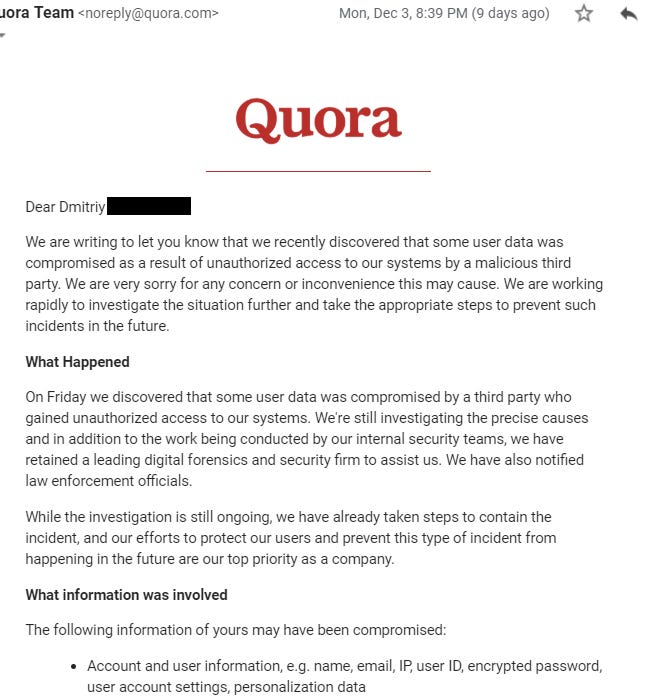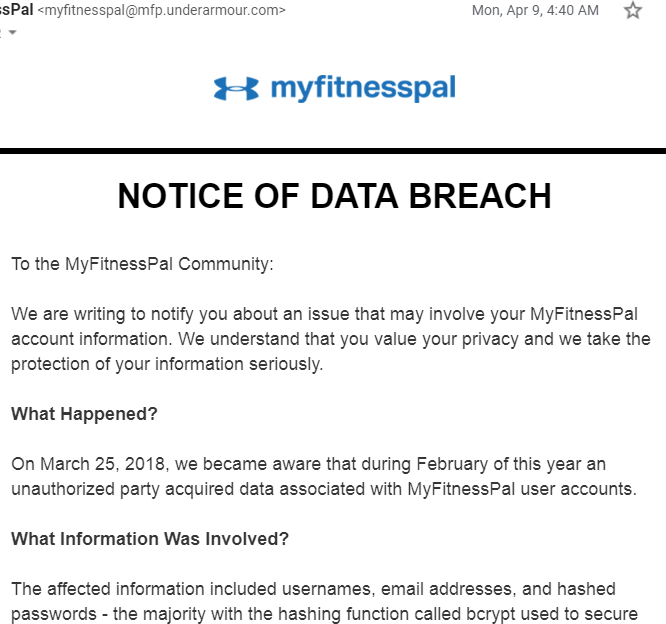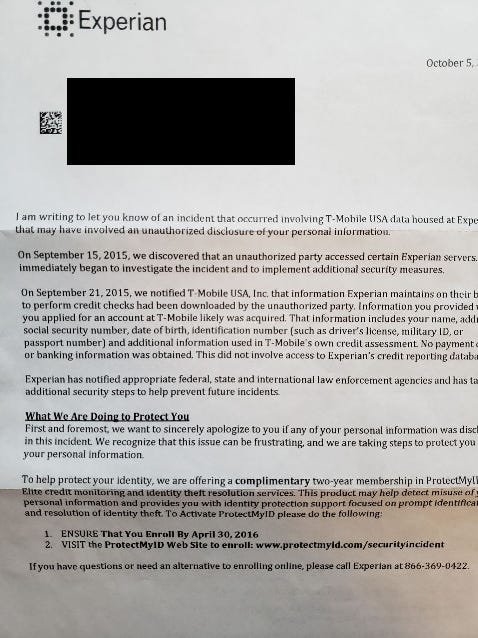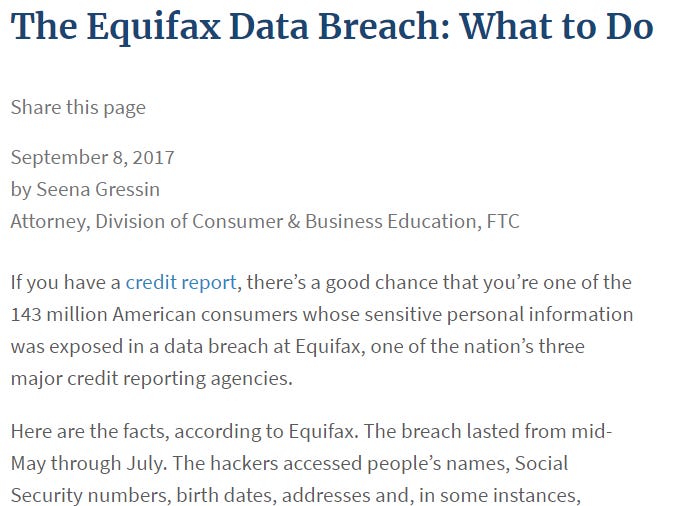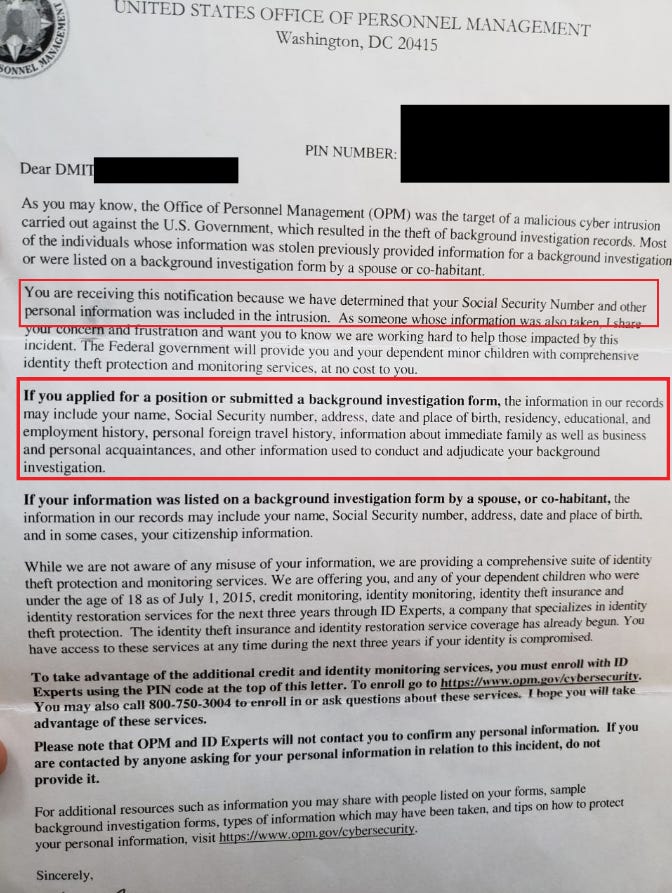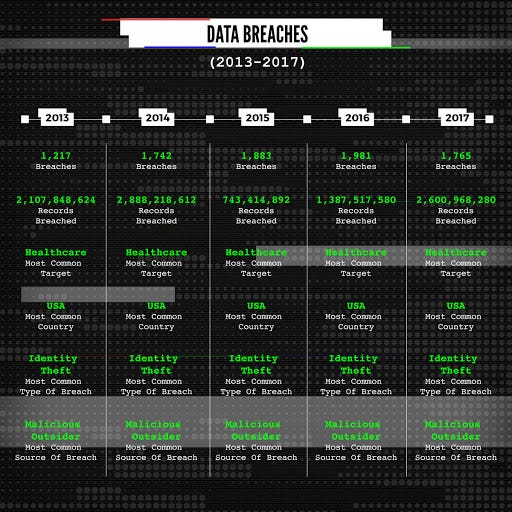The Internet identity crisisThis isn't going to be a rant on how the NSA is engaged in systematic violations of personal privacy. Nor is this going to be how Facebook employees are so paranoid they're using burner phones to communicate (can't blame them tho, they know the extent to which data is mined more than anyone). It won't even be about the gigabytes of data Google has on you. I just want to give you some intangibles to consider. Your data will get stolen if you trust Quora.
Your data will get stolen if you trust myfitnesspal.
Your data will get stolen if you trust T-Mobile.
Your data will get stolen if you trust Equifax.
 The Equifax service to check if your data was compromised requires you to opt-out of class action against them This is how a cartel acts The Equifax service to check if your data was compromised requires you to opt-out of class action against them This is how a cartel actsYour data will get stolen if you trust the government.Yes, the photo below is real, I still have the letter. In a previous life (this was circa 2015) I considered working for the government. I went through a rigorous background investigation and had all my data stolen because some dude thought it was a good idea to use public WiFi in Southeast Asia. I did not accept the offer.
The US has seen 6,551 individual data breaches 2013-2017In 2017 data was stolen at a frequency of about:
Not if, whenIt's not a matter of if an organization you trust is going to get hacked, but when is that organization going to get hacked. Google can't secure your data. Banks can't secure your data. The NSA can't secure your data. The only way an organization can secure your data is if they don't collect it in the first place. It is ridiculous to even think that a startup is going to be able to secure your data when a national intelligence agency can't secure the details of my background investigation. This includes cryptocurrency related startups like Coinbase and Binance and every crack pot ICO you've every heard of. The price of losing privacyAndreas Antonopoulos has a great talk about the price of losing privacy and I'm going to try to summarize the main points here. The problem with privacy is that the implications of losing your privacy are not immediately apparent (i.e., you can lose your privacy today, but go to jail in 6 years because of something in your browsing history). Ever hear of the phrase let one thousand flowers bloom? Mao Zedong created this program in post-revolutionary China. To "let a hundred flowers blossom," which was the idea of openness to allow the explosion of creative expression. Even those of dissidents.
The Chinese intelligentsia were invited to criticize the political system in Communist China. And people believed it. And their opinions were carefully recorded and cataloged. And then the purge happened, and hundreds of thousands of folks who believed the idea were murdered.
Bitcoin is consumer protectionIt is very difficult to overlay identity on top Bitcoin. Which is good, because no one knows how to secure data. Your internet identity may be compromised, but you should atleast try to be vigilant of folks trying to steal your Bitcoin financial data. Regulators have failed to protect consumers. Bitcoin protects consumers by putting control in the hands of the consumers themselves. An alarm should go off in your head anytime you hear words like "Know-your-customer (KYC)" or " Anti-money laundering (AML)." Here's an example:  🚀UPDATE: Our Stellar (XLM) Airdrop is active and in progress! Already signed up for the waitlist? You should be receiving an email shortly with next steps. Verified your profile and waiting for your Airdrop? It shouldn't be much longer. 🚀UPDATE: Our Stellar (XLM) Airdrop is active and in progress! Already signed up for the waitlist? You should be receiving an email shortly with next steps. Verified your profile and waiting for your Airdrop? It shouldn't be much longer.Last month Stellar announced they're airdropping $125 million to Blockchain wallet users. No big deal right? Just one condition, you need to KYC. The problem here is that Airdrops come at the expense of privacy.  Today @blockchain.info came up with a new idea: go through a KYC process with your wallet account, potentially holding 7 years of Bitcoin transaction history, to get $25 worth of some random penny stock. Please don't do this. If you want $25-worth of $XLM for some reason, buy it Today @blockchain.info came up with a new idea: go through a KYC process with your wallet account, potentially holding 7 years of Bitcoin transaction history, to get $25 worth of some random penny stock. Please don't do this. If you want $25-worth of $XLM for some reason, buy it  Would you trade potentially 7 years of Bitcoin transaction history for $25? The idea that a bitcoin exchange or some crypto startup is going to secure your KYC/AML and all of your privately identifiable information is a joke. Like I said before, It is ridiculous to even think that a startup is going to be able to secure your data when a national intelligence agency can't secure the details of my background investigation. With Bitcoin, only YOU can de-anonymize yourselfYou de-anonymize yourself when you associate a bitcoin addresses with an exchange, or a merchant that does KYC, or a shipping address, or your name, etc… Chain analysis is real and it is scary. Financial surveillance is not a joke. Censorship resistance doesn't matter if you don't have privacy. So please, don't shoot yourself in the foot. -Dmitriy You're on the free list for CoinSheet. For the full experience, become a paying subscriber. |


